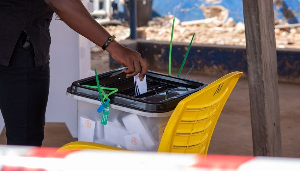“I wan go home,” Kenya Eulita Jerop tell BBC from Lebanon, wia she dey work as house maid.
But di agreement for her employment make am difficult for her to leave, even though serious fear dey say war fit happun for di kontri.
Fear wan kill her sake of di unfamiliar sounds wey she dey hear from di outskirts of di capital, Beirut.
Di 35-year-old don dey work dia for di past 14 months.
“Fear catch me die. Dem tell us say no be bombs, but na [planes dey break] di sound barrier,” she say. “But di sound bin dey hit so hard.”
Many odas for her WhatsApp group of fellow domestic workers follow her dey fear too.
Di loud boom for sky dey come from fighter planes. Di fear be say dis one fit be di beginning of full-on war.
Israel and Lebanon-based group Hezbollah don dey exchange fire across dia border nearly everyday since di 7 October Hamas attack on Israel. E make Israel invade Gaza, wit mind say dem dey eliminate Hamas.
Hezbollah, wey be political movement and Iran-backed militant group, say e dey attack Israel in support of di Palestinian pipo.
Di bombs dey mostly fall for southern Lebanon and northern Israel, but pipo dey worry say e fit spread to di rest of Lebanon as di conflict dey transform into wider regional struggle.
US, UK, Australia, France and Canada all don give official warning to dia kontri pipo make dem leave Lebanon as soon as possible.
But getting out dey easier for some dan odas.
Madam Jerop say e dey common for employers to take dia passport once dem land Lebanon.
Even wit passport, domestic workers still need exit visa to leave – document wey dia oga or madam must to approve.
Authorities for di kontri dey allow dis to happun under di “kafala” (sponsorship) system for foreign workers – wey don employ about 250,000 pipo.
“Kafala” dey give individuals and companies permit to employ foreign workers.
Dis one mean say dia immigration status depend completely on dia employer and dem no get plenty rights.
Employers fit take advantage of dia position and many women dey overwork, wit small pay and dem dey dey physically abused – though dis no be di case for Madam Jerop.
Despite calls for significant changes, di system still dey continue for several Arab states.
Daniela Rovina, communications officer for International Organization for Migration, tell BBC say under international law, dem must to allow pesin to leave any kontri if war occur.
For Madam Jerop case, her employers want her to continue to work for Lebanon.
"Dem dey say di situation don dey here for Lebanon for many years, and notin dey to worry about,” she say. “But for us, di tension dey high. We no dey used to dis kain [bombing] sounds.”
But even wit papers, Madam Jerop and her fellow domestic workers dey face oda challenges to leave.
“Few flights dey available and dem dey very expensive,” she tok.
Flights to Kenya cost up to $1,000 (£770).
Banchi Yimer, wey be founder of one organisation wey dey support rights of Ethiopian domestic workers, say di average monthly salary wey dem bin dey pay before na $150 but since di cost-of-living crisis, wey hit Lebanon hard, “many no dey even collect pay at all”.
“Every day, we dey receive calls from women wey dey panic… dem dey ask us if we get any [evacuation] plan, if we fit do anytin about am.”
Chiku, anoda domestic worker from Kenya, wey we change her name to protect her safety, no fit pay for di flight.
She don dey live for Baabda, for west of Lebanon, for almost a year.
“I personally for like go back home. But di tickets dey so costly,” she tok. “And my mama and papa also no fit afford dat money.”
She don dey live in fear for di past few weeks, but like Jerop, her employer don tell her to stay.
“Dem say I no fit leave becos I neva finish my contract,” Chiku tok. “But dis contract dey more important dan my life?”
Di Lebanese labour ministry neva still respond to BBC request for comment.
Kenyan authorities say if war true true break out, dem go put evacuation plan in place.
Roseline Kathure Njogu, wey dey in charge of diaspora affairs for Kenyan goment, tell BBC say di department fit issue emergency travel documents for pipo wey no get dia passports.
She give assurance say Kenya goment go dey able to provide emergency flights.
“We get around 26,000 Kenyans for Lebanon, and 1,500 don register wit us for evacuation,” she tok.
But many wan leave right now.
Ethiopia goment tok tok pesin Nebiyu Tedla tell BBC say dem dey “prepare contingency plans to evacuate diplomats and citizens from Lebanon if necessary”.
However, Madam Banchi make di point say, even before di Israel-Gaza conflict, dem bin don already get many Ethiopian women wey dey stranded for Lebanon wey dey desperate to leave.
Lebanon economy wey collapse for 2020 make many Ethiopian domestic workers no get work.
“Many no fit even afford rent or medical assistance, let alone flight to go home,” she tok.
While foreign embassies dey continue to work on evacuation plans, many dey feel say dia goment don abandon dem to take care of demsef.
Chiku dey try keep some money to take pay for flight wey go take her home.
“But what about di odas wey no fit?” she ask.

Hezbollah and Israel don exchange fire across Lebanon-Israel border
Click to view details



BBC Pidgin of Thursday, 22 August 2024
Source: BBC




















